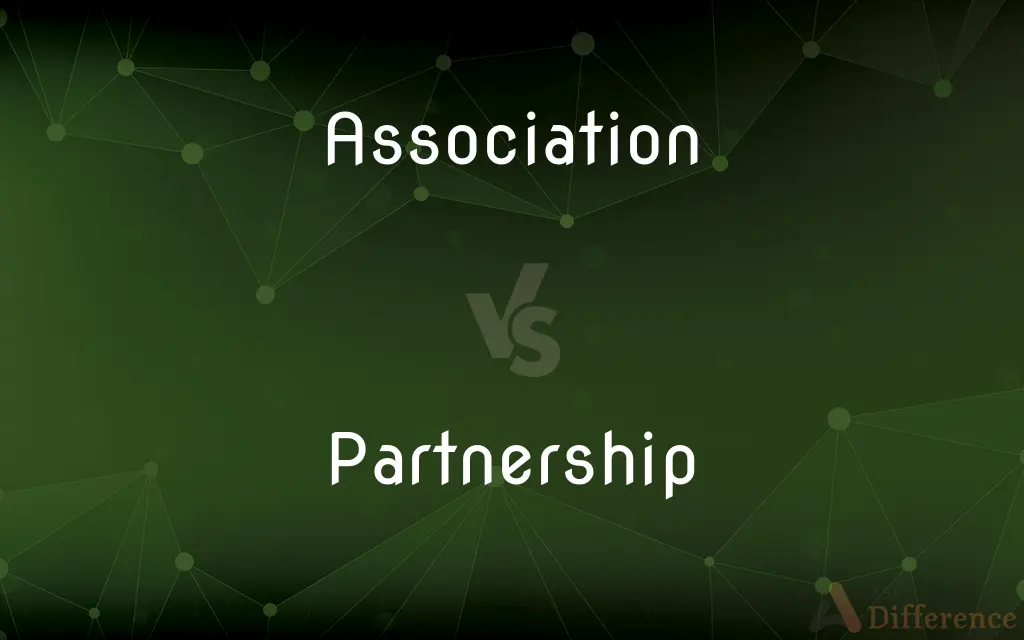Association vs. Partnership — What's the Difference?
By Urooj Arif & Maham Liaqat — Updated on March 5, 2024
Association refers to a group formed for a specific purpose, often non-profit, while partnership denotes a business entity owned by two or more individuals sharing profits and liabilities.

Difference Between Association and Partnership
Table of Contents
ADVERTISEMENT
Key Differences
Associations are typically organized around a common interest or goal, not necessarily focused on making a profit. These can range from professional organizations to community groups. On the other hand, a partnership is a specific type of business structure where two or more people own and operate a business together, sharing in the profits and losses.
Members come together to share resources, knowledge, or to advocate for a cause, with a focus on benefiting all members or the wider community. Whereas in a partnership, the primary goal is to conduct business activities with the aim of generating profit, which is then distributed among the partners according to their agreement.
Associations often rely on membership dues, donations, and grants for funding, and they may provide members with resources, networking opportunities, and other benefits. Partnerships, however, generate revenue through business activities and are subject to specific tax and legal regulations that govern their operation and the distribution of profits.
The structure of an association is usually defined by its charter or bylaws, which outline its purpose, membership criteria, and governance. A partnership is governed by a partnership agreement, which details the roles, responsibilities, profit distribution, and procedures for resolving disputes among partners.
Associations do not have owners in the traditional sense; they are governed by a board of directors or a similar body elected by the members. In contrast, a partnership has clear ownership, with partners who have invested in the business and have a say in its operation, directly tying their personal assets to the business's liabilities.
ADVERTISEMENT
Comparison Chart
Purpose
Common interest or goal, often non-profit
Conducting business for profit
Funding
Membership dues, donations, grants
Business activities, investments
Primary Goal
Benefit members or community
Generate profit
Governance
Charter or bylaws, board of directors
Partnership agreement
Ownership
No traditional owners, governed by members
Owned by two or more partners
Legal Structure
Not defined by profit motive
Defined by profit-sharing and liabilities
Benefits
Resources, networking, advocacy
Profit distribution, business operation control
Taxation
Subject to specific non-profit regulations
Partners are taxed on their share of profits
Compare with Definitions
Association
Governed by a charter or bylaws.
The association's bylaws specify the rules for electing board members.
Partnership
Governed by a partnership agreement.
Their partnership agreement outlines how decisions are made.
Association
Offers resources and networking to members.
The trade association provides industry research and networking events.
Partnership
Partners have a say in operation.
All partners meet monthly to discuss business operations.
Association
A group formed around a common purpose, not primarily for profit.
The local homeowners' association organizes community events.
Partnership
A business owned by two or more individuals sharing profits and liabilities.
They formed a partnership to open a new restaurant.
Association
Funded by dues, donations, or grants.
The association relies on annual membership dues for its operations.
Partnership
Profits and losses are distributed among partners.
In their partnership, profits are divided equally.
Association
Operates to benefit a community or members.
The environmental association focuses on conservation efforts.
Partnership
Directly ties personal assets to business liabilities.
In a general partnership, each partner's personal assets can be used to cover business debts.
Association
The act of associating or being connected with
My parents disapproved of my association with my friends from across town.
Partnership
A partnership is an arrangement where parties, known as business partners, agree to cooperate to advance their mutual interests. The partners in a partnership may be individuals, businesses, interest-based organizations, schools, governments or combinations.
Association
An organized body of people who have an interest, activity, or purpose in common; a society.
Partnership
The state of being a partner or partners
We should go on working together in partnership
Association
A mental connection or relation between thoughts, feelings, ideas, or sensations
My therapist helped me examine my association of food with comfort.
Partnership
An association of two or more people as partners
An increase in partnerships with housing associations
Association
The process of bringing ideas or events together in memory or imagination;
Conditioning is a form of learning by association
Partnership
A contract between two or more persons who agree to pool talent and money and share profits or losses
Common Curiosities
Can an association engage in business activities?
Yes, but any profits from such activities must typically support the association's non-profit purpose, not be distributed among members.
Can individuals in a partnership be held personally liable for business debts?
Yes, in many types of partnerships, partners' personal assets can be used to cover business debts.
What's the main difference between an association and a partnership?
The main difference is their purpose: associations are usually formed for a common interest without a profit motive, while partnerships are established to conduct business and generate profit.
Are partnerships always for profit?
Yes, partnerships are established as business entities with the intention of making and distributing profits among partners.
Are there different types of partnerships?
Yes, common types include general partnerships, limited partnerships, and limited liability partnerships, each with different implications for liability and management.
How does governance differ between associations and partnerships?
Associations are governed by a charter or bylaws and a board of directors, while partnerships are governed by a partnership agreement outlining each partner's roles and shares.
Is membership in an association the same as ownership in a partnership?
No, association members do not own the organization or share in its profits like partners in a partnership.
Can one be a member of an association and a partner in a partnership simultaneously?
Yes, one can be both, as long as the roles and activities in each do not conflict legally or ethically.
Can associations become partnerships?
An association can decide to engage in for-profit activities and restructure as a partnership, but this requires significant legal and operational changes.
How do associations and partnerships handle taxation?
Associations are often subject to special non-profit tax regulations, while partnerships' profits are taxed as personal income to the partners.
Share Your Discovery

Previous Comparison
Fat vs. Greasy
Next Comparison
Dirigible vs. ZeppelinAuthor Spotlight
Written by
Urooj ArifUrooj is a skilled content writer at Ask Difference, known for her exceptional ability to simplify complex topics into engaging and informative content. With a passion for research and a flair for clear, concise writing, she consistently delivers articles that resonate with our diverse audience.
Co-written by
Maham Liaqat













































